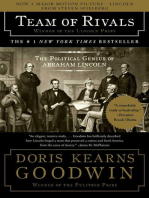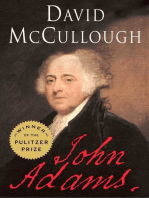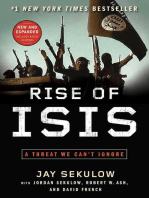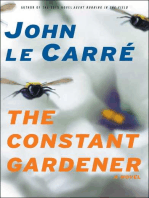About Bharata
About Bharata
Uploaded by
jram00Copyright:
Available Formats
About Bharata
About Bharata
Uploaded by
jram00Original Description:
Copyright
Available Formats
Share this document
Did you find this document useful?
Is this content inappropriate?
Copyright:
Available Formats
About Bharata
About Bharata
Uploaded by
jram00Copyright:
Available Formats
The Mahabharata (Sanskrit Mahabharata ???????, IPA: [m??a?'b?a?r?t??
]) is one of the two major Sanskrit epics of ancient India, the other being the Ramayana. Th e epic is part of itihasa.[1] Besides its epic narrative of the Kurukshetra War and the fates of the Kauravas and the Pandavas, the Mahabharata contains much philosophical and devotional mat erial, such as a discussion of the four "goals of life" or purusharthas (12.161) . The latter are enumerated as dharma (right action), artha (purpose), kama (ple asure), and moksha (liberation). Among the principal works and stories that are a part of the Mahabharata are the Bhagavad Gita, the story of Damayanti, an abbr eviated version of the Ramayana, and the Rishyasringa, often considered as works in their own right. Traditionally, the authorship of the Mahabharata is attributed to Vyasa. There h ave been many attempts to unravel its historical growth and compositional layers . The oldest preserved parts of the text are not thought to be appreciably older than around 400 BCE, though the origins of the story probably fall between the 8th and 9th centuries BCE.[2] The text probably reached its final form by the ea rly Gupta period (ca. fourth century CE).[3] The title may be translated as "the great tale of the Bharata dynasty". According to the Mahabharata itself, the ta le is extended from a shorter version of 24,000 verses called simply Bharata.[4] The Mahabharata is the longest Sanskrit epic.[5] Its longest version consists of over 100,000 shloka or over 200,000 individual verse lines (each shloka is a co uplet), and long prose passages. About 1.8 million words in total, the Mahabhara ta is roughly ten times the length of the Iliad and Odyssey combined, or about f our times the length of the Ramayana.[6][7] W. J. Johnson has compared the impor tance of the Mahabharata to world civilization to that of the Bible, the works o f Shakespeare, the works of Homer, Greek drama, or the Qur'an.[8]
You might also like
- The Subtle Art of Not Giving a F*ck: A Counterintuitive Approach to Living a Good LifeFrom EverandThe Subtle Art of Not Giving a F*ck: A Counterintuitive Approach to Living a Good LifeRating: 4 out of 5 stars4/5 (5891)
- The Gifts of Imperfection: Let Go of Who You Think You're Supposed to Be and Embrace Who You AreFrom EverandThe Gifts of Imperfection: Let Go of Who You Think You're Supposed to Be and Embrace Who You AreRating: 4 out of 5 stars4/5 (1103)
- Never Split the Difference: Negotiating As If Your Life Depended On ItFrom EverandNever Split the Difference: Negotiating As If Your Life Depended On ItRating: 4.5 out of 5 stars4.5/5 (870)
- Grit: The Power of Passion and PerseveranceFrom EverandGrit: The Power of Passion and PerseveranceRating: 4 out of 5 stars4/5 (597)
- Hidden Figures: The American Dream and the Untold Story of the Black Women Mathematicians Who Helped Win the Space RaceFrom EverandHidden Figures: The American Dream and the Untold Story of the Black Women Mathematicians Who Helped Win the Space RaceRating: 4 out of 5 stars4/5 (912)
- Shoe Dog: A Memoir by the Creator of NikeFrom EverandShoe Dog: A Memoir by the Creator of NikeRating: 4.5 out of 5 stars4.5/5 (543)
- The Hard Thing About Hard Things: Building a Business When There Are No Easy AnswersFrom EverandThe Hard Thing About Hard Things: Building a Business When There Are No Easy AnswersRating: 4.5 out of 5 stars4.5/5 (352)
- Elon Musk: Tesla, SpaceX, and the Quest for a Fantastic FutureFrom EverandElon Musk: Tesla, SpaceX, and the Quest for a Fantastic FutureRating: 4.5 out of 5 stars4.5/5 (474)
- Her Body and Other Parties: StoriesFrom EverandHer Body and Other Parties: StoriesRating: 4 out of 5 stars4/5 (830)
- The Sympathizer: A Novel (Pulitzer Prize for Fiction)From EverandThe Sympathizer: A Novel (Pulitzer Prize for Fiction)Rating: 4.5 out of 5 stars4.5/5 (122)
- The Little Book of Hygge: Danish Secrets to Happy LivingFrom EverandThe Little Book of Hygge: Danish Secrets to Happy LivingRating: 3.5 out of 5 stars3.5/5 (414)
- The Emperor of All Maladies: A Biography of CancerFrom EverandThe Emperor of All Maladies: A Biography of CancerRating: 4.5 out of 5 stars4.5/5 (272)
- The Yellow House: A Memoir (2019 National Book Award Winner)From EverandThe Yellow House: A Memoir (2019 National Book Award Winner)Rating: 4 out of 5 stars4/5 (99)
- The World Is Flat 3.0: A Brief History of the Twenty-first CenturyFrom EverandThe World Is Flat 3.0: A Brief History of the Twenty-first CenturyRating: 3.5 out of 5 stars3.5/5 (2270)
- Devil in the Grove: Thurgood Marshall, the Groveland Boys, and the Dawn of a New AmericaFrom EverandDevil in the Grove: Thurgood Marshall, the Groveland Boys, and the Dawn of a New AmericaRating: 4.5 out of 5 stars4.5/5 (269)
- Team of Rivals: The Political Genius of Abraham LincolnFrom EverandTeam of Rivals: The Political Genius of Abraham LincolnRating: 4.5 out of 5 stars4.5/5 (235)
- A Heartbreaking Work Of Staggering Genius: A Memoir Based on a True StoryFrom EverandA Heartbreaking Work Of Staggering Genius: A Memoir Based on a True StoryRating: 3.5 out of 5 stars3.5/5 (232)
- On Fire: The (Burning) Case for a Green New DealFrom EverandOn Fire: The (Burning) Case for a Green New DealRating: 4 out of 5 stars4/5 (74)
- The Unwinding: An Inner History of the New AmericaFrom EverandThe Unwinding: An Inner History of the New AmericaRating: 4 out of 5 stars4/5 (45)
- Language of Clinical TrialsDocument36 pagesLanguage of Clinical Trialsjram00No ratings yet
- HI KPI GuidelinesDocument65 pagesHI KPI Guidelinesjram00100% (1)
- August 11 SalesDocument5 pagesAugust 11 Salesjram00No ratings yet
- Smart Phone Apps MarketDocument1 pageSmart Phone Apps Marketjram00No ratings yet












































